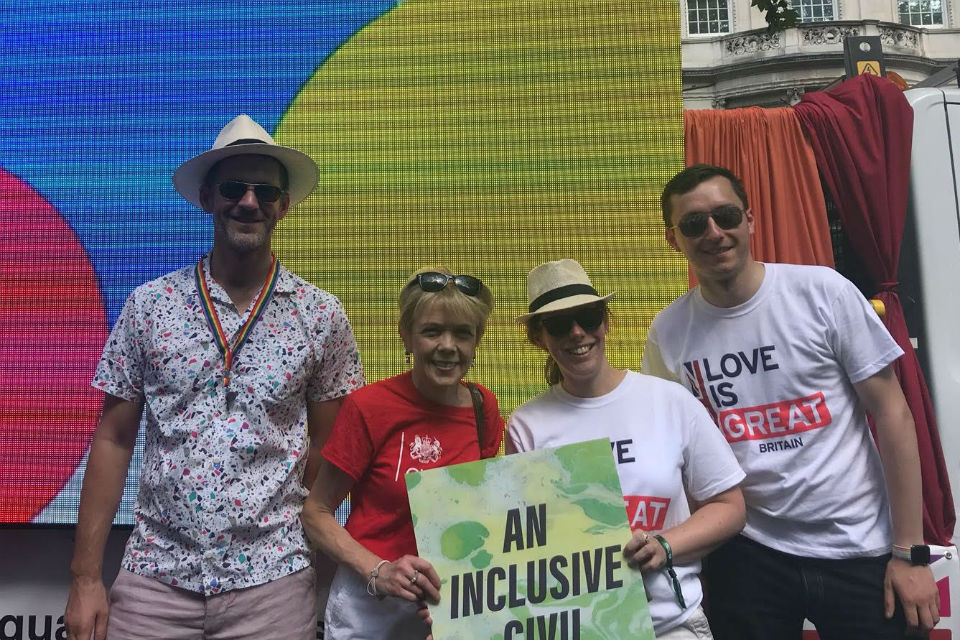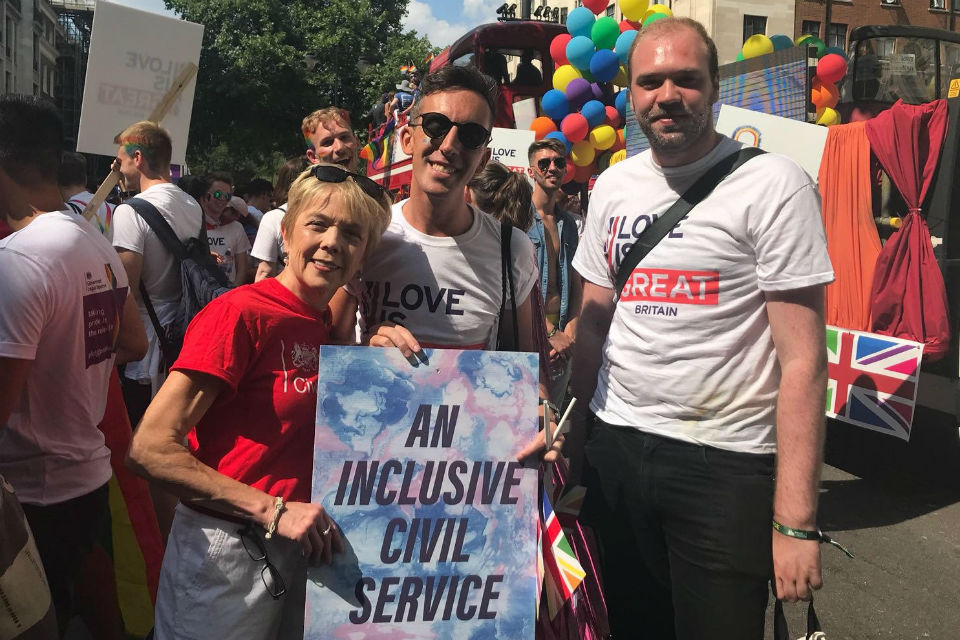
The ‘Pride in London Parade’ is on 7 July, and I am really looking forward to taking part as a proud Ally, along with many civil servants. I know many of you will have already taken part in Pride parades up and down the country, and more of you will be doing so over the coming months. This will be my 5th in so many years.
This year’s theme is #PrideMatters, and the organisers are asking participants to ask themselves: What does Pride mean to you?
So what does Pride mean to me?
For me, Pride is a chance to celebrate the extraordinary progress we have made in the UK, even over my working lifetime. Anyone who watched the BBC series A Very English Scandal will have been reminded of what it was like 40 years ago. In 1984, my friend Chris Smith was the first MP to come out; many others have followed. And we now have same sex marriage.
But there is no room for complacency. Pockets of homophobia remain, as demonstrated by the national survey of LGBT people carried out by Government Equalities Office, the results of which were published on 3 July. Still, LGBT people in the UK feel the need to be cautious: for example, over two- thirds of gay couples won’t hold hands in public; and LGBT people are more likely to experience mental health issues.

Our ambition
As Civil Service Champion and Senior Ally for our LGB&TI community, I am so proud of the progress we have made towards creating a more inclusive workplace for LGB&TI civil servants. Last October we published our Civil Service Diversity and Inclusion Strategy. This encapsulates our ambition to become the UK’s most inclusive employer by 2020, and includes a commitment to take targeted action to ensure the working environment is LGB&TI-inclusive. We are currently developing an action plan to take this forward.
I’m really heartened to see in the 2017 annual Civil Service People Survey that the Engagement and Inclusion & Fair Treatment scores were higher for staff who identified as Lesbian, Gay, Bisexual or Other (non-heterosexual) than they have ever been.
I’m really encouraged also by your response to a trial question in last year’s People Survey which enabled staff to indicate their gender identity. We consulted widely with staff networks before we tested this, and I’m pleased to say this question will now be embedded in future years, so that we may understand the experiences of diverse staff in the Civil Service.

That’s not to say we are perfect, and it is important that we acknowledge there is still a lot more to do. For example, LGBO and Transgender respondents to the People Survey are more likely to say that they have experienced bullying, harassment and discrimination; and only 45% of all civil servants have given us information about their sexual orientation. We are therefore working with our staff networks to understand how we can improve in these areas.
Celebration and determination
It’s great to see the good work going on across departments to champion LGB&TI inclusion, as reflected in the 25 nominations received this year for this category of the Civil Service Diversity & Inclusion Awards. The 2017 Award was won by the Chair of “Sh..OUT”, the Ministry of Defence (MOD) LGBT+ Network, for his work implementing the Stonewall LGBT Straight Allies initiative across the MOD.
Pride gives us an opportunity to recognise and value the contribution of our LGB&TI colleagues and communities to the work of the Civil Service, and to celebrate our achievements thus far. At the same time, it allows us to renew our determination to continue our work to ensure the Civil Service provides an inclusive working environment for all our staff.
Inclusion means we are able to ‘be ourselves’ at work – to be different from each other in many ways and all feel supported, empowered, valued, respected and fairly treated. It is the quality of our daily experience working in the Civil Service. For me, Pride means exactly this. Being proud of our differences, being able to bring our best selves to work and to foster inclusive and brilliant workplaces.
What does Pride mean to you?
 I am proud to be an Ally to our LGB&TI staff, and proud of the work done so well by our LGB&TI staff networks. I would urge you to contact your own staff networks to find out how you can be involved in making the Civil Service the most inclusive employer for LGB&TI people, and to look out for Pride events across the country in the coming months.
I am proud to be an Ally to our LGB&TI staff, and proud of the work done so well by our LGB&TI staff networks. I would urge you to contact your own staff networks to find out how you can be involved in making the Civil Service the most inclusive employer for LGB&TI people, and to look out for Pride events across the country in the coming months.
And I ask you - what does Pride mean to you?
Tweet your answer, using #Pride2018 and #CivilServicePride.

1 comment
Comment by Gavin Thomas posted on
Thank you Sue for your continued support as an LGBT+ Champion. I am currently working overseas but as a LGBT+ Straight Ally I continue to wear my rainbow lanyard with a great sense of self-respect for my colleagues and with a sense of purpose.
During my time in East Africa, I recall a couple who were not able to be their real selves for fear of their personal safety. I met them after they returned to the UK and it was great to see them relaxed and being able to show affection for each other in public. It was then I really gain a true sense of how far the UK had come in terms on an inclusive society in which we all can express who we really are. I appreciate that there are still the few who have yet to grasp this concept and behaviour in an unacceptable manner. Certainly as an Ally I will continue to challenge such behaviour and support my friends and colleagues.
In terms of what does Pride mean to me? The freedom to be your true self without prejudice or fear of personal safety. A celebration of the fantastic work that has been done to create an environment where everyone is treated with fairness and equality.